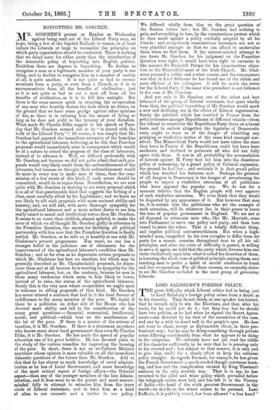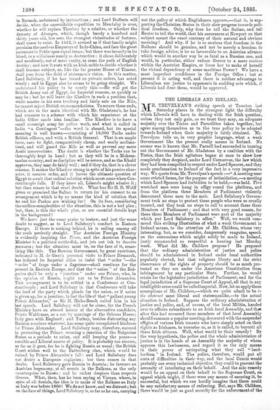LORD SALISBURY'S FOREIGN POLICY.
THE great difficulty which Liberal critics feel in being just to Lord Salisbury's foreign policy arises from a doubt as to his sincerity. They do not think, as one speaker has hinted, that he intends only to win the Elections, and then alter hie route, for he could not do it ; but they fear lest he should. have two policies, as he had when he signed the Secret Agree.. ment—one dictated by his view of the necessities of the case, and one by a wish to stand well in the people's eyes. He does not want to cheat, except as diplomatists cheat, in their pro- fessional way ; but he may be doing something through private notes differing considerably from what he appears to be doing in the telegrams. We certainly have not yet read the riddle- of his character sufficiently to be sure that he is pressing only- to his avowed end ; but subject to that reserve, it is only just to give him credit for a steady effort to keep the national policy straight. As regards Burmah, for example, he has given the French Government a much-needed though courteous warn- ing, and has met the complication created by King Theeban'e rashness in the only sensible way. That is to say, he has recurred to the older and wiser policy which prevailed before the telegraph cables were laid, and has left it to the Viceroy of India—the head of the sixth greatest Government in the- world—to decide on the wisest course to be pursued. Lord Dufferio, it is publicly stated, has been allowed "a free hand in Burma.h, unfettered by instructions; and Lord Dufferin will decide, when the unavoidable expedition to Mandalay is over, whether he will replace Theebau by a relative, or whether the dynasty of Alompra, which, though barely a hundred and thirty years old, has seen the strangest vicissitudes of fortune, shall cease to exist. In 1822, it seemed as if that family might proclaim themselves Emperors of Indo-China, and face the great potentate in Pekin upon equal terms; but there was insanity in its blood, or a wilfulness nearly as destructive ; it chose deliberately and needlessly, out of mere vanity, to cross the path of English destiny; and now it rests with an Irish noble to decide whether it shall become subject, or, like the far greater House of Timour, shall pass from the field of statesmen's vision. In this matter, Lord Salisbury, if he has issued no private orders, has acted wisely ; and in Egypt also he seems to be going straight. We understand his policy to be nearly this :—He will get the British Army out of Egypt, for Imperial reasons, as quickly as may be ; but he will leave the Khedive in such a position that, while master in his own territory and fairly safe on the Nile, he cannot reject British recommendations. To secure these ends, which are in the main identical with Mr. Gladstone's, he has had recourse to a scheme with which his experience at the India Office made him familiar. The Khedive is to have a small conscript army for police work, and what is called in India "a Cantingent "—the word is absurd, but its special meaning is well known—consisting of 18,000 Turks under British officers, and with a British General. That is an ample force, sure to fight, comparatively cheap, and easily acclima- tised, and will guard the Nile as well as prevent any more Arabi insurrections. The doubt is whether the Turks can be thoroughly kept in hand ; but as they will be in a Maham- ruedan country, and as discipline will be severe, and as the Khalif approves, they may do fairly well ; and if they do, that is a clever scheme. It makes the Khedive strong in spite of his passive char- acter, it secures order, and it leaves the ultimate question of Egypt to await that radical solution which must come when Con- stantinople falls. If they knew all, Liberals might admire it ; but then comes in that cruel doubt. What has Sir H. D. Wolff given or promised the Sultan in return for his consent to an arrangement which is by no means the kind of solution that he and his Pashas are wishing for ? On its face, considering the endless complexities of the situation, this is not a bad plan ; but, then, is this the .whole plan, or are essential details kept in the background ?
We have just the same praise to bestow, and just the same doubt to suggest, as to Lord Salisbury's conduct in Eastern Europe. If there is nothing behind, he is sailing among all the reefs perfectly straight. The Austrian Foreign Ministry is evidently inspiring the Times, and the Austrian Foreign Minister is a political cuttle-fish, and jets out ink to deceive pursuers ; but the situation must be, on the face of it, some- thing like this. The Russian Government, by great exertions, indicated in M. de Giers's personal visits to Prince Bismarck, has induced its Imperial allies to insist that "order "—the " order" of frogs under a flagstone—shall continue for the present in Eastern Europe, and that the " union " of the Bul- garias shill be only a " junction " under one Prince, who, in the opinion of Russia, ought not to be Prince Alexander. This arrangement is to be settled in a Conference at Con- stantinople; and Lord Salisbury in that Conference will take the lead of the party which pleads for the union, or if union is given up, for a junction, to last the life of that "gallant young Prince Alexander," as Sir M. Hicks-Beach called him in his last speech. Lord Salisbury will not be alone, for the French Ministry have an absurd horror of the alternative candidate, Prince Waldemar, as a son by marriage of the Orleans House; Italy goes with England ; and Turkey, besides distrusting any Russian nominee whatever, has some quite unexplained kindness for Prince Alexander. Lord Salisbury may, therefore, succeed in protecting the Prince, securing a junction of the Bulgarian States as a prelude to union, and still keeping the peace—a sensible and Liberal course of policy. It is probably too sincere, so far as it goes, for he is fighting Russia as usual ; the British Caurt wishes well to the Battenberg clan, which would be ruined by Prince Alexander's fall; and Lord Salisbury does not desire a European explosion ; but then comes in that doubt. Lord Salisbury gave Bosnia to Austria ; he favours an Austrian hegemony, at all events in the Balkans, as the only counterpoise to Russia ; and he rather despises than respects Greece. What, then, has he been saying at Vienna, where, in spite of all denials, the idea is to make of the Balkans an Italy as Italy was before 1860? We do not know, and we distrust; but on the face of things, Lord Salisbury is, so far as he can, carrying out the policy of which Englishmen approve,—that is, is sup- porting the Christian States in their slow progress towards poli- tical freedom. Only, why does he tell the Sultan, and tell Renter to tell the world, that his assurances at Newport on that subject meant the exact contrary of their natural and obvious meaning ? And why, if he is so anxious that freedom in the Balkans should be genuine, and not be merely a freedom to take foreign advice, is he so favourable to an Austrian advance which would in another way be as fatal as a Russian one, and would, in particular, either reduce Greece to a mere enclave within the Austrian Empire, or force her to make of herself the virtual dependency of some maritime Power ? We have a. most imperfect confidence in the Foreign Office ; but at present it is acting well, and there is neither advantage to Liberalism nor justice to opponents in scolding acts which, if Liberals had done them, would be approved.



































 Previous page
Previous page